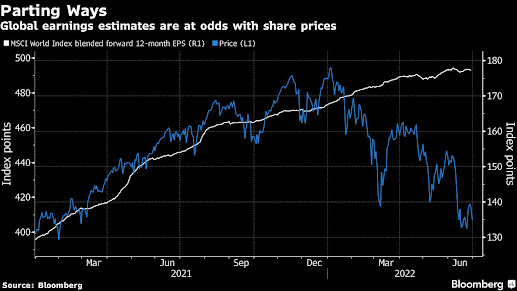ECONOMY, MARKETS AND EARNINGS - The unbreakable relationship
ECONOMY, MARKETS AND EARNINGS - The unbreakable relationship
The stock market is the word of the hour. Everyone
wants to make a lot of money via investing. People are on the constant lookout
for a multibaggers that would turn around their lives. The Indian markets are
booming, and everyone is looking for an opportunity to wash their hands in the
flowing water. While this is great, one has to understand why our markets are
booming. At the end of the day, the relationship between markets, the economy,
and earnings is what describes the path of the markets and your portfolio.
Markets are a reflection of earnings as well as the state of the economy. As
for the relationship between markets and earnings, as said earlier, markets and
earnings are positively correlated. Meaning, if Indian companies report poor or
negative earnings, then the markets are supposed to fall. This phenomenon takes
place because we value companies based on their earnings. To simplify the
statement, investors will invest in a company only if they are able to predict
the company's earnings in the years to come and not the share price. For
example, the reason why we are experiencing buying in energy stocks is that
investors are betting that these companies are going to earn a lot of money in
the future as India is transitioning from a crude-driven economy to a greener
economy and hence the share price would rise. Investors are betting on future
earnings and not current earnings. Another example would be Amazon. Back in the
90’s, Mr. Bezos understood the importance of the internet and what kind of
disruption the product was about to deliver, followed by the earnings, and
hence he bet everything he had on one project, and look where he is today. If
investors believe that India will need at least a decade to implement this
transition, we may see a sell-off in energy stocks. But the principle remains
the same, which is that earnings and markets go hand in hand. Speaking about
the economy, positive economies would unquestionably have positive markets as
companies would enjoy record earnings and new businesses would open up,
followed by a lot of fundraising. Vice-versa, stagnant or falling or even
negative economies would have negative markets as companies would be in the
doldrums. It’s just like an ordinary human. Our performance tends to fluctuate
according to our environment. Speaking about the health of the economy, we use
various economic indicators to judge its health. For example, companies would
go on a capital expenditure cycle because the demand for that particular good
is increasing. For example, auto companies in India are experiencing one of the
biggest capex cycles experienced by this nation as demand for cars as well as
2-wheelers is strong. Companies like Maruti Suzuki went out and opened 2 new
manufacturing plants in Gujarat, which had a cost of around Rs 10500 Cr.
followed by Tata Motors, which bought Ford’s plant to increase its
manufacturing capacity. The company spent more than Rs 3000 Cr on various other
projects. India has 2 economic indicators which track these changes and adjust
themselves accordingly. The indicators are the PMI, or purchasing managers'
index, and the IIP, which stands for Index for Industrial production. The PMI
has a benchmark of 50. PMI above 50 means the economy is flourishing as
production is increasing as demand is resilient and a data below 50 means that
the country is facing a slowdown. Germany is going through this same
situation, and hence, German markets are down by more than 20%. German
investors are worried about the future earnings of companies listed in the DAX (German
Index) and, hence, they are valuing companies accordingly. In all, what I want
to convey is that the markets will perform in parallel to what is happening in
the economy. They have to adjust according to the country’s economic health and
earnings reported by their companies. As I pen down this article, i.e., 30th
Aug, and as it happens to be MR Buffet’s birthday, I would like to quote one of
his famous statements, which goes by, "Markets can stay irrational longer
than you can stay solvent."




Comments
Post a Comment